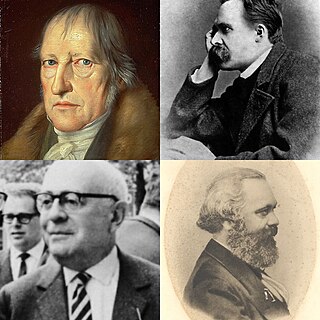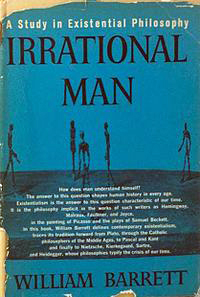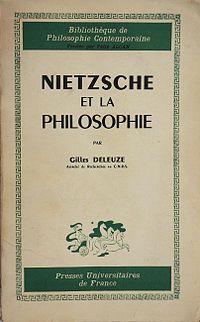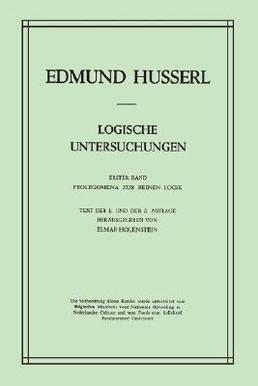
German philosophy, meaning philosophy in the German language or philosophy by German people, in its diversity, is fundamental for both the analytic and continental traditions. It covers figures such as Gottfried Wilhelm Leibniz, Immanuel Kant, Georg Wilhelm Friedrich Hegel, Karl Marx, Friedrich Nietzsche, Martin Heidegger, Ludwig Wittgenstein, the Vienna Circle, and the Frankfurt School, who now count among the most famous and studied philosophers of all time. They are central to major philosophical movements such as rationalism, German idealism, Romanticism, dialectical materialism, existentialism, phenomenology, hermeneutics, logical positivism, and critical theory. The Danish philosopher Søren Kierkegaard is often also included in surveys of German philosophy due to his extensive engagement with German thinkers.

The Frankfurt School is a school of thought in sociology and critical philosophy. It is associated with the Institute for Social Research founded at Goethe University Frankfurt in 1923. Formed during the Weimar Republic during the European interwar period, the first generation of the Frankfurt School was composed of intellectuals, academics, and political dissidents dissatisfied with the socio-economic systems of the 1930s: namely, capitalism, fascism, and communism. Significant figures associated with the school include Max Horkheimer, Theodor Adorno, Walter Benjamin, Wilhelm Reich, Herbert Marcuse, and Jürgen Habermas.
Continental philosophy is an umbrella term for philosophies prominent in continental Europe. Michael E. Rosen has ventured to identify common themes that typically characterize continental philosophy. These themes proposed by Rosen derive from a broadly Kantian thesis that knowledge, experience, and reality are bound and shaped by conditions best understood through philosophical reflection rather than exclusively empirical inquiry.

Being and Time is the 1927 magnum opus of German philosopher Martin Heidegger and a key document of existentialism. Being and Time is among the most influential texts of 20th century philosophy. It had a notable impact on subsequent philosophy, literary theory and many other fields. Though controversial, its stature in intellectual history has been compared with works by Kant and Hegel. The book attempts to revive ontology through an analysis of Dasein, or "being-in-the-world." It is also noted for an array of neologisms and complex language, as well as an extended treatment of "authenticity" as a means to grasp and confront the unique and finite possibilities of the individual.
Raya Dunayevskaya, later Rae Spiegel, also known by the pseudonym Freddie Forest, was the American founder of the philosophy of Marxist humanism in the United States. At one time Leon Trotsky's secretary, she later split with him and ultimately founded the organization News and Letters Committees and was its leader until her death.

Eros and Civilization: A Philosophical Inquiry into Freud is a book by the German philosopher and social critic Herbert Marcuse, in which the author proposes a non-repressive society, attempts a synthesis of the theories of Karl Marx and Sigmund Freud, and explores the potential of collective memory to be a source of disobedience and revolt and point the way to an alternative future. Its title alludes to Freud's Civilization and Its Discontents (1930). The 1966 edition has an added "political preface".
Seyla Benhabib is a Turkish-born American philosopher. Benhabib is a senior research scholar and adjunct professor of law at Columbia Law School. She is also an affiliate faculty member in the Columbia University Department of Philosophy and a senior fellow at the Columbia Center for Contemporary Critical Thought. She was a scholar in residence at the Law School from 2018 to 2019 and was also the James S. Carpentier Visiting professor of law in spring 2019. She was the Eugene Mayer Professor of Political Science and Philosophy at Yale University from 2001 to 2020. She was director of the program in Ethics, Politics, and Economics from 2002 to 2008. Benhabib is well known for her work in political philosophy, which draws on critical theory and feminist political theory. She has written extensively on the philosophers Hannah Arendt and Jürgen Habermas, as well as on the topic of human migration. She is the author of numerous books, and has received several prestigious awards and lectureships in recognition of her work.

Reason and Revolution: Hegel and the Rise of Social Theory is a book by the philosopher Herbert Marcuse, in which the author discusses the social theories of the philosophers Georg Wilhelm Friedrich Hegel and Karl Marx. Marcuse reinterprets Hegel, with the aim of demonstrating that Hegel's basic concepts are hostile to the tendencies that led to fascism.
Robert Buford Pippin is an American philosopher. He is the Evelyn Stefansson Nef Distinguished Service Professor in the John U. Nef Committee on Social Thought, the Department of Philosophy, and the college at the University of Chicago.

Irrational Man: A Study in Existential Philosophy is a 1958 book by the philosopher William Barrett, in which the author explains the philosophical background of existentialism and provides a discussion of several major existentialist thinkers, including Søren Kierkegaard, Friedrich Nietzsche, Martin Heidegger, and Jean-Paul Sartre. Irrational Man helped to introduce existentialism to the English-speaking world and has been identified as one of the most useful books that discuss the subject, but Barrett has also been criticized for endorsing irrationality and for giving a distorted and misleading account of Georg Wilhelm Friedrich Hegel.

Nietzsche and Philosophy is a 1962 book about Friedrich Nietzsche by the philosopher Gilles Deleuze, in which the author treats Nietzsche as a systematically coherent philosopher, discussing concepts such as the will to power and the eternal return. Nietzsche and Philosophy is a celebrated and influential work. Its publication has been seen as a significant turning-point in French philosophy, which had previously given little consideration to Nietzsche as a serious philosopher.

Marxism and Freedom: from 1776 Until Today is a 1958 book by the philosopher and activist Raya Dunayevskaya, the first volume of her 'Trilogy of Revolution'.

Knowledge and Human Interests is a 1968 book by the German philosopher Jürgen Habermas, in which the author discusses the development of the modern natural and human sciences. He criticizes Sigmund Freud, arguing that psychoanalysis is a branch of the humanities rather than a science, and provides a critique of the philosopher Friedrich Nietzsche.

Main Currents of Marxism: Its Origins, Growth and Dissolution is a work about Marxism by the political philosopher Leszek Kołakowski. Its three volumes in English are The Founders, The Golden Age, and The Breakdown. It was first published in Polish in Paris in 1976, with the English translation appearing in 1978. In 2005, Main Currents of Marxism was republished in a one volume edition, with a new preface and epilogue by Kołakowski. The work was intended to be a "handbook" on Marxism by Kołakowski, who was once an orthodox Marxist but ultimately rejected Marxism. Despite his critical stand toward Marxism, Kołakowski endorsed the philosopher György Lukács's interpretation of the philosopher Karl Marx.

The Logical Investigations is a two-volume work by the philosopher Edmund Husserl, in which the author discusses the philosophy of logic and criticizes psychologism, the view that logic is based on psychology.
In Marxist philosophy, reification is the process by which human social relations are perceived as inherent attributes of the people involved in them, or attributes of some product of the relation, such as a traded commodity.

Herbert Marcuse was a German–American philosopher, social critic, and political theorist, associated with the Frankfurt School of critical theory. Born in Berlin, Marcuse studied at the Humboldt University of Berlin and then at Freiburg, where he received his Ph.D. He was a prominent figure in the Frankfurt-based Institute for Social Research, which later became known as the Frankfurt School. In his written works, he criticized capitalism, modern technology, Soviet Communism, and popular culture, arguing that they represent new forms of social control.

Soviet Marxism: A Critical Analysis is a 1958 book by the philosopher Herbert Marcuse, in which the author provides a critique of the Ideology of the Communist Party of the Soviet Union. It received positive reviews, describing it as a convincing discussion of its subject.

Introduction to the Reading of Hegel: Lectures on the Phenomenology of Spirit is a 1947 book about Georg Wilhelm Friedrich Hegel by the philosopher Alexandre Kojève, in which the author combines the labor philosophy of Karl Marx with the Being-Toward-Death of Martin Heidegger. Kojève develops many themes that would be fundamental to existentialism and French theory such as the end of history and the Master-Slave Dialectic.

History and Class Consciousness: Studies in Marxist Dialectics is a 1923 book by the Hungarian philosopher György Lukács, in which the author re-emphasizes the philosopher Georg Wilhelm Friedrich Hegel's influence on the philosopher Karl Marx, analyzes the concept of "class consciousness," and attempts a philosophical justification of Bolshevism.


















